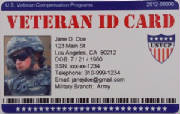|
|
|
HomeNDCOnline CoursesASVAB PracticeUSAF PDG TestsUSVCP StoreDischarge CertificatesVeteran Directory2016 Comp RatesSMC RatesEmergency Data CardVeteran ID CardLuggage ID CardDisabilitiesBusiness DirectoryVerify ServiceBenefits NewsComp QuestionsCompensation NewsHow to WinVet CentersVSO DatabaseVA Regional OfficesState BenefitsSVC CompensationCompensation FAQsAgent OrangePsych CompMST CompensationRare CompensationLocate War BuddyMedical RecordsStressor LettersFormsBrochuresFREE GuidesVideosPress ReleasesContact UsMembershipUpcoming EventsDiscountBizArchive RecordsHomeless AlertSubmit ArticleVSO of the YearClassifiedsAbout USVCP
|
|
|
3 Things Every Veteran in College Should
Know By: Paul Szoldra December 30, 2011 Veterans are a special population that is growing on college campuses today. The
G.I. Bill has been in place since 1944, and marked the beginning of the rise of The Greatest Generation. It stayed relatively
unchanged until very recently.
In 2008, Congress made significant changes to the bill, and updated it as the Post 9/11 G.I. Bill. The changes made access to college easier and the benefits of attendance much greater. Some of the key provisions were direct tuition payment to the school, an additional payment for books, and a monthly living allowance. These benefits have helped a huge number of veterans who otherwise might have not attended higher learning. From the year 2000-2008, veteran usage of VA educational benefits was relatively stable at around 500,000. The Post 9/11 GI Bill drastically changed this. Since 2008, there has been a 32% increase in educational usage. This trend will surely continue as the wars come to a close and our military troop levels are reduced. As the level of veteran enrollment rises, the need for support for these veterans is crucial. Many of these prospective students know that they want to attend college, but are unsure of just where to begin. I think there are three things that every veteran needs to be aware of before and during their higher learning experience. 1. You can and should attend college. Our country has moved from a country of manufacturing to a country of services. In fact, over 70% of the jobs in the U.S. are service-based. What this means is that it takes more than a labor-mindset. You need to be able to think, innovate, and learn. For most of these jobs, the minimal requirement is a Bachelors degree. The direction our economy is heading, may even lead to a minimum of a Masters. If you have earned the right to the G.I. Bill, you should use it and not be left behind. 2. Utilize the Resources Available to You Many schools realize the benefits of having veterans on campus. They bring maturity and leadership to the classroom, in addition to guaranteed payment of tuition through the G.I. Bill. Veterans need to realize that there is plenty of help out there, but you need to seek it out. Many campuses have VA Certifying officials on site to help with your paperwork, Veterans Centers to service the specific community, and there are websites like CollegeVeteran.com, which connect veterans on campus nationwide. 3. Being on the GI Bill doesnt mean you cant get other Financial Support One of the biggest mistakes many veterans make is their thinking that using the GI Bill means you cant get anything else. This line of thinking can potentially cost you thousands of dollars. Think of the GI Bill as just one of many scholarships that you potentially qualify for. The Federal Application for Student Aid (FAFSA) is the one place to apply for all kinds of aid, whether it be grants, scholarships, or loans. Filling out the application is free, and can potentially net you at least some scholarships and grants. Dont miss out. There are many more things that veterans need to know to be successful in college so this list is by no means complete. I just hope that it can reach veterans and help them to be as amazing in their achievements in higher learning as they have been in the military.
|
|
[ Articles ]
|
|
|
|
|

